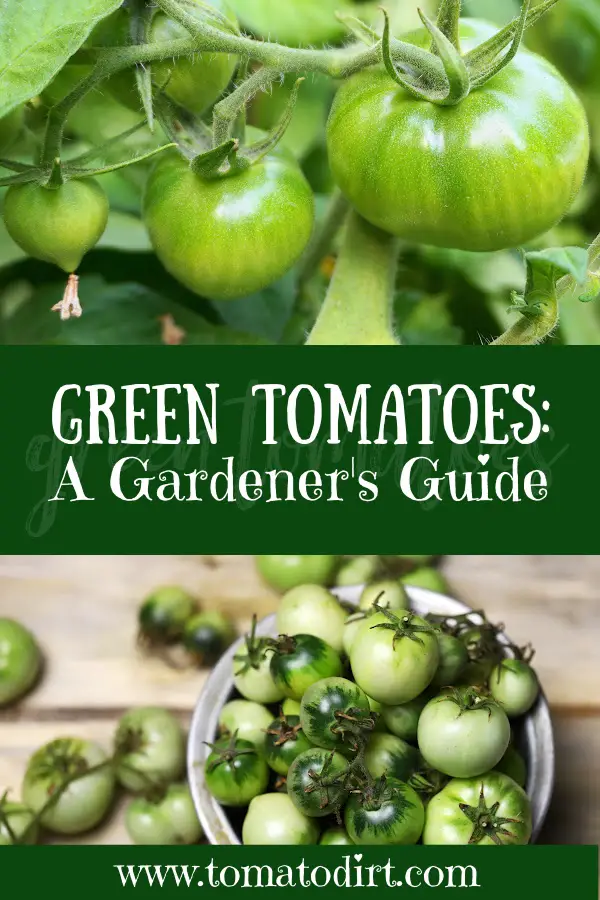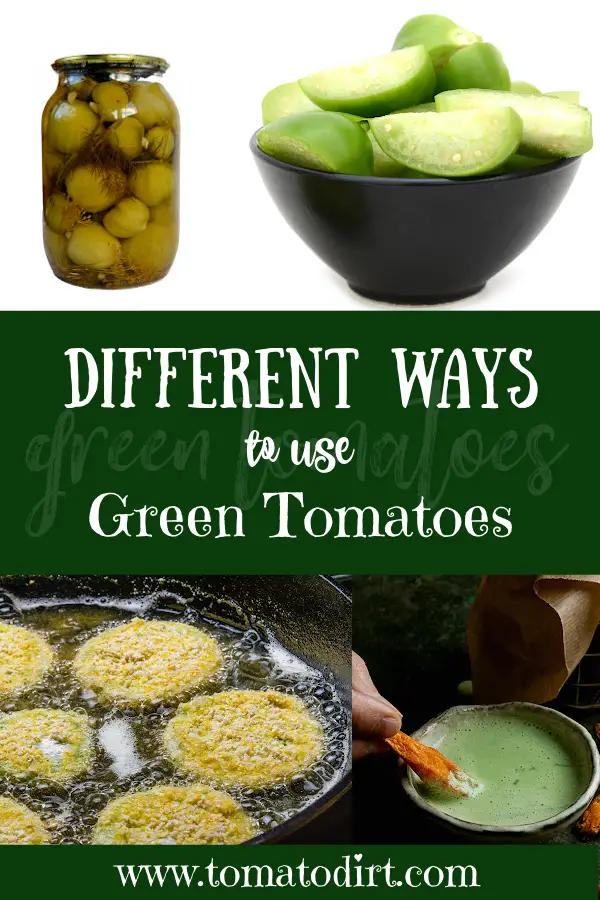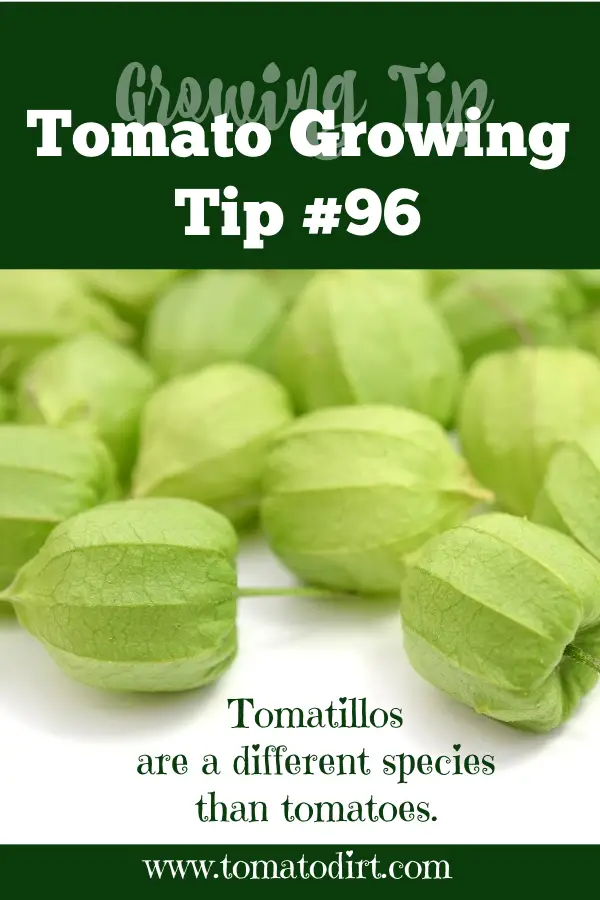FREE: 10 Must-Know Tomato Growing Tips Get The Guide
Read our affiliate disclosure here.
Green
Tomatoes: A Gardener’s Q & A
Since 2010, Tomato Dirt has garnered 4.8+ million views, making it the web’s leading online source for growing tomatoes in the home garden. Award-winning writer and Tomato Dirt owner Kathy Widenhouse has helped thousands of home gardeners grow healthier tomatoes. Be one of them when you get Tomato Dirt’s Growing Guide here.
Posted 8.31.24
Green tomatoes are a bit of a curiosity. Say the word “tomato” and most of us think of luscious red globes sliced on a sandwich or the sweet explosive flavor from a ripe cherry variety that explodes in your mouth.
While green tomatoes aren’t red, they have plenty of culinary potential. That’s part of their mystery.
Here’s the most frequently asked questions and answers about green tomatoes.
1. Are green tomatoes just unripe red tomatoes?
Yes and no. Green tomatoes can be unripe red tomatoes. Or they may be specific varieties that stay green even when fully ripe.
The most common green tomatoes are simply regular red tomatoes that haven't undergone the ripening process to turn red, orange, yellow, pink, or purple – whichever color is their indicator of ripeness. These tomatoes have a firm texture and tangy, more acidic flavor compared to their ripe counterparts. They are often used in cooking, especially in dishes like fried green tomatoes, because of their firmness.
But some tomato varieties are green even when fully ripe. These tomatoes are bred to remain green at maturity and are not unripe. Each has a unique flavor. Among the most common green tomato varieties are Green Zebra, Aunt Ruby’s German Green, Cherokee Green, and Evergreen.
2. Can you pick green tomatoes?
Yes! In fact, there are several reasons why you might want to pick them while they're still green:
- To fry them. As mentioned, green tomatoes are perfect for frying. They have a firm texture and a tangy flavor that works well in fried dishes.
- To prevent frost damage. If you’re approaching the end of the growing season and frost is imminent, it's wise to pick your green tomatoes before the frost can damage them.
- To ripen them indoors. Green tomatoes can ripen off the vine if picked early. Place them in a warm area, and they’ll slowly turn red over time. You can speed up the process by placing them in a paper bag with a ripe banana.
- To use in recipes. Green tomatoes aren’t just for frying. They can also be used in salsas, chutneys, pickles, and other recipes where their tart flavor shines.
3. When should you harvest green tomatoes?
You should pick green tomatoes …
- Before frost. If frost is expected, pick all your green tomatoes to prevent frost damage, which can ruin the fruit.
- At the end of growing season: When temperatures drop and the days get shorter, tomatoes might stop ripening on the vine. This is a good time to pick green tomatoes.
- When they are firm to the touch, they’re mature enough to pick, even if they’re still green. Firm tomatoes are perfect for frying or other uses.
- If they have reached their full size but haven’t started to show any red or orange color. Mature green tomatoes are usually the same size they would be if they were to ripen.
- When the skin is glossy. Tomatoes with a glossy sheen on their skin indicate maturity, even if they’re still green. These tomatoes can be picked and used in various dishes or ripened indoors.
4.
Can green tomatoes ripen off the vine?
Ripening green tomatoes off of the vine is a simple process that can be done using a few different methods.
- Paper bag method. Place your green tomatoes in a paper bag. Add a ripe banana or apple to the bag, which releases ethylene gas, a natural ripening agent. Keep the bag in a warm, dark place, like a pantry or cupboard. Check the tomatoes daily, removing any that start to ripen to prevent over-ripening or spoilage.
- Box method. Place a single layer of green tomatoes in a shallow box or tray. You can use newspaper to separate layers if you need to stack them. For quicker ripening, place a banana or apple in the box. Store the box in a cool, dark, and slightly humid place, such as a basement. Check the tomatoes every few days, removing any that have ripened.
- Windowsill method. Place your green tomatoes on a sunny windowsill, stem side down. This method works best with tomatoes that are starting to show some color. Rotate the tomatoes occasionally to ensure even ripening. Check the tomatoes daily to avoid over-ripening.
- Hanging plant method. If you have an entire tomato plant with green tomatoes, uproot the plant and hang it upside down in a cool, dark place like a garage or basement. The tomatoes will slowly ripen on the vine, often yielding a better flavor. Check the plant every few days to pick any ripe tomatoes.
5. How should you ripen green tomatoes fast?
Place green tomatoes in a paper bag with a ripe banana or apple to speed up the ripening process. These fruits release ethylene gas, which helps ripen tomatoes faster.
6. How can you use green tomatoes in cooking?
Unripe green tomatoes can be pickled, used in chutneys, or ripened for eating raw, depending on personal preference and culinary tradition. Plus, fried green tomatoes became popular in the United States in the late 19th and early 20th centuries.
The earliest known recipes for fried green tomatoes appeared in the late 19th century in Midwestern cookbooks and Jewish immigrant communities, such as The Settlement Cook Book (first published in 1901). During the Great Depression (1929–1939), unripe green tomatoes were often cooked to prevent waste, as people sought to make the most out of all available produce, especially if frost came before tomatoes could fully ripen.
But it was the 1991 movie Fried Green Tomatoes that helped popularize fried green tomatoes as a Southern comfort food in the American consciousness. While not a traditional Southern dish, fried green tomatoes became embraced in Southern cuisine in the mid-to-late 20th century. The concept of using unripe produce aligned with the Southern tradition of preserving and resourcefulness in cooking. The dish is now a well-established part of Southern culinary culture.
7. When should you pick green tomatoes for frying?
It’s often best to pick green tomatoes toward the end of the growing season when temperatures start to drop. This is because the tomatoes won’t ripen well in cooler weather, making them ideal for frying.
Pick green tomatoes that are close to their mature size but haven’t started to ripen. Mature green tomatoes are typically full-sized, meaning they’re as big as they would be if they were to ripen. The tomatoes should be firm to the touch. When you gently squeeze them, they should resist pressure and not feel soft or mushy.
The ideal tomatoes for frying will be fully green with no signs of pink or red. However, they might have a slight blush of white or yellow, which is okay as long as they haven’t started to turn red. A good indicator is a glossy sheen on the tomato’s skin. This suggests the tomato is mature enough to be firm but not yet ripe.
8. Can green tomatoes be frozen?
Yes! Freezing green tomatoes is a convenient way to extend their season and reduce waste.
Green tomatoes are firmer than fully ripened ones, which means they are excellent candidates for freezing. You can prepare them as you would for freezing ripened tomatoes: wash, remove stems, and plunge into boiling water followed by an ice bath to remove skins. Pat them dry. Then place tomatoes on a baking tray lined with parchment paper. Freeze tomatoes for a couple of hours. Then pack them in resealable freezer bags. Tomatoes will keep in the freezer for up to a year.
9. Are green
tomatoes the same as tomatillos?
No. Green tomatoes are members of the nightshade family. Tomatillos are a different species: Physalis philadelphica.
They are small, round, green fruits covered in a papery husk. Tomatillos have a tart, citrusy flavor, often compared to green apples or sour tomatoes. They are a key ingredient in Mexican cuisine, especially in dishes like salsa verde. Tomatillos are usually cooked or roasted to soften and enhance their flavor, though they can also be eaten raw in some dishes.
10.
Are green tomatoes good for you?
Green tomatoes are a good source of vitamins A, C, and K, as well as antioxidants. Plus, green tomatoes contain potassium, which is essential for maintaining healthy blood pressure levels and lutein and zeaxanthin, which are important for eye health. These nutrients help protect your eyes from harmful light and may reduce the risk of cataracts and macular degeneration.
Fiber in green tomatoes can help lower cholesterol levels and reduce the risk of heart disease. To top it off, green tomatoes are low in calories.
Bottom line: yes, green tomatoes are good for you ... in moderation. Read on.
11. Can green tomatoes make you sick?
Green tomatoes can potentially make you sick if you consume them in large quantities – largely because of a compound named solanine. It’s a natural toxin found in the nightshade family (which includes tomatoes, potatoes, and eggplants).
Solanine is more concentrated in the stems, leaves, and unripe fruits of a tomato plant. While the amount of solanine in green tomatoes is usually low, consuming them in large quantities could cause symptoms of solanine poisoning, which may include nausea, vomiting, diarrhea, stomach cramps, headaches, dizziness, and in severe cases, it can lead to neurological symptoms like confusion or even hallucinations.
Cooking green tomatoes – as well as pickling or fermenting them – reduces the solanine content significantly, making them safer to eat. This is why dishes like fried green tomatoes are popular and generally safe.
Tomato Dirt best advice: moderation.
More about harvesting and ripening tomatoes
Harvesting tomatoes: when to pick them ...
How Do You Ripen Tomatoes on the Vine Faster?
What To Do with Green Tomatoes at the End of the Season ...
How to Extend the Harvest of Homegrown Tomatoes …
How to save tomato seeds to plant next year ...
Tips for Topping a Tomato Plant to Extend Harvest ...
Protecting tomatoes from frost and freezing ...
Get more tips on our Harvesting Tomatoes Pinterest board...
Return from Green Tomatoes: A Gardener's Q & A to Tomato Dirt home
As an Amazon Associate and Rakuten Advertising affiliate I earn from qualifying purchases.
SHARE THIS PAGE:
FREE! 10 Must-Know Tomato Growing Tips: 20-page guide
Get yours here:






